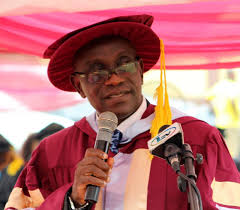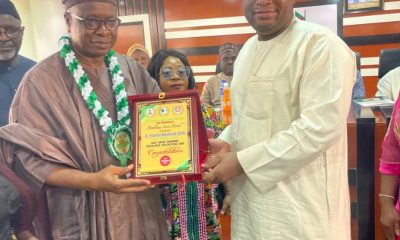Personality Interview
‘It Is A Wrong Notion To Label NIJ A Glorified Secondary School’ – NIJ Provost, Gbenga Adefaye

The Provost, Nigerian Institute of Journalism, Mr Gbenga Adefaye, speaks to EKO HOT BLOG PAUL MBAGWU and JOY UDOH about his career, and role as Provost
EDITOR’S PICK:
- ‘Press Gets No Budgetary Allocations’- Baba Ijebu Decries, Bags NIJ Award
- NIJ Provost, Adefaye Charges New Intakes At 19th Matriculation
- NIJ Convocation Lecture: Media, National Security And Nation Building By Kayode Fayemi (Full Text)
Tell us about the transition from Vanguard Newspaper to the Nigerian Institute of Journalism (NIJ)? How was it and what prompted it, if there was anything like that?
It is not a major transition, because it’s a dual assignment. I am still at Vanguard. I am doing a special assignment at the NIJ courtesy of the board to come and fill in when the last provost was leaving. In terms of transition, it is not major. What is happening now is a combination of theory and practice.
I am still practising; am trying to train the young ones who will take over from us. That’s the story; it is not a major shift. Taking them on what they teach in the classroom and what they practice in the field. That’s exactly what we are trying to do. It’s like trying to marry the two.
Don’t forget that NIJ is a special institution with a bias for training for the industry and improved skills for practitioners in all spheres of mass communication studies, be it newspaper job, advertising, broadcasting and public relations, and right now in the age of social media, we are thinking of content creators.
Can you make a comparison between running a media outfit and running a school of mass communication?
It is quite different. In the field, running a media house you are dealing with a business, you must have a focus and you must have an idea. Even though there is a lot about social responsibility, you are running for profit. But a school is really for social responsibility for the development of personnel. It is not for profit generation when you run a school.
That is a major difference, otherwise, every organization follow a peculiar structure, whereas in the industry you are talking about the board, like we have in the school, talking about the executives, mode of planning and all of that. But in the school, emphasis is on capacity building and development and all of that.
So, a school is definitely different from a business, and running a school is different from running a business. But you need both, this is because they run at the same principle of responsibility and delivery of the task.
Did Vanguard Newspaper prepare you for the challenges you are facing in NIJ at the moment and in what ways?
Of course, Vanguard Newspaper did. In Vanguard, we deal with a manner of people in different departments who must bring in particular skills to deliver on stated objectives. While in the school, we have a stated objective of training the young ones and giving them a future.
In terms of the big preparation for the big assignment of running a school, coming from Vanguard, I have an idea of what the industry requires, and so I try to tailor the training to what the industry will need.
We are not at the age where people leave school and begin to write employment applications. We must train the students to think entrepreneurially. That was why I spoke about content creators earlier. If you leave school now and all you do is go and write applications for jobs, you won’t get any because there are no jobs. But if you leave school and you can do what you are doing here now, some people will come looking for you. And that is the difference.
What has been your experience since you became the provost of NIJ, putting into consideration your background as an editor?
It is been a very interesting experience, I am working with very diligent people who are focused and committed. That is an advantage; it makes it easier to direct and relate. That essentially is it.
What are the challenges?
Funding is a major challenge. NIJ is a private monotechnic, it doesn’t get subventions or money from the government, it depends largely on fees, levies, grants and donations, and that has been quite challenging. Again, NIJ is a specialized school; it is not free to take in any number. The programmes are regulated by National Board for Technical Education (NBTE), so, there is a limit to the number of students you can take.
For National Diploma (ND) levels, we just got approval last year for three streams of 40 students per stream which is a maximum of 120 students and of course ND through HND level and all of that. It’s regulated, so there is a limit to the number of students we can take. That means there is a limit to the revenue that comes your way. As a result, we have to be prudent, which is quite a challenge.
Again, don’t forget NIJ is 50 the infrastructure is ageing and the overhead is higher, you have to be prudent in its use. Hence, we have to really go out and mobilize resources from the stakeholders, public-spirited persons and of course the little fees that come from the students.
In the real sense, it is quite a challenge funding any private school now if you don’t get grants. But if you are creative, lucky, have a good profile and good income stream, you can get support like grants and sponsorship. With that, you can coast along.
N I J is one of the best citadels of learning in journalism and even one of the 1st schools of journalism in the country, one would have expected a more robust growth.
No! We have to go back in history. IPI set up NIJ to provide skilled training for workers in the industry – that is for them to go and upscale their skills. This was how NIJ functions until the years back when there was a transition and it started taking NBTE regulated programmes.
In those days when it was just the industry sending people for training, the stakeholders could bring in resources as may be required, but now when you are training generally through JAMB and other means, and the programmes are regulated by NBTE, there are limits to what resources you can mop up. Of course, they (NBTE) have their own control measures. If you are a specialised school, your training must meet a specialised standard and so, you are not allowed to run like you are running the Oyigbo market. As a result, there is a limit to the number you can take for the ND and HND programme and of course, there is a limit to how much you will be able to realise from their fees and others.
It is not that you have a vicious board (NBTE) limiting you, that is just the peculiar circumstance of your existence. However, because NIJ has a dual advantage of both academic and institutional professional training we are not limited to the kind of special programme- special training it can run and which we are trying to upscale to emphasize. When we do house training for companies, for industries and all of that, then we can raise money. It is not as organized as the one you get from the ND and HND.
So to answer your question directly, nobody goes out to limit you, but the circumstances you found yourself in, coupled with the industry itself, and then a large number of media training institutions in the country; means you are also competing for students. It’s a choice between going to the University of Lagos, School of Media and Communication Studies, Pan African University, Lagos Poly, Yaba Tech and NIJ. You can see that it is competition, and if people do not know the quality of education you provide, they will not come. A lot of people didn’t know that NIJ graduates take National Diploma Certificates, Higher National Diploma Certificates or even go for NYSE. Hence, in terms of marketing, NIJ has to do a lot more on that to create awareness.
And like I said to you, it’s a competition. It’s between brand NIJ and other schools of media communication out there.
Publicity and marketability are virtually none existent. Some people say NIJ is an advanced secondary school. What’s your take on these?
You are right about publicity and marketing; I am working harder on that, but as to whether NIJ is an advanced secondary school, I disagree totally, that cannot be. This is a school that has produced great names in journalism practice in Nigeria and so it is not an advanced secondary school. It is a monotechnic awarding ND and HND certification and training postgraduate students to become professionals in media studies.
A lot of people in the industry who already have a first degree in other disciplines come to NIJ to professionalise. So, it is a wrong notion to Label NIJ a glorified secondary school, No! It is as competent as they come with very qualified staff and highly skilled professionals from the industry who are also adults training there to meet society’s needs.
Did you really set out to be a journalist?
For me, from day one I set out to do mass communication. I got the inspiration from when I was in secondary school. My literature teacher has a diploma in journalism and he has an interesting way of delivering his speeches in the assembly. That was the motivation. For me it wasn’t by error; I did a first degree in Mass Communication at the University of Nigeria, Nsukka and did my second degree in Mass Communication at the University of Lagos before I started doing executive education. So it was by design for me.
How has the journey been compared to what the new generation of journalists is facing?
Very sweet! I don’t know what they are facing. But I know that if you have come to this profession because you want to make lots of money, you are on the wrong path, but if you have come here to build a career, probably to build fame – to be notable and influential in the society, it’s a good place to base a good profession.
For me, it’s been fun and I have enjoyed this business. I have been in it without break since 1984 and I don’t intend to break it until am unable to do it anymore.
I am going to be having a meeting here soon, that means I am going to be sitting with people like Mallam Kabiru Yusuf, Chairman of Daily Trust, who has been in journalism all his life; Chief Olusegun Oshoba will be here, he has been a journalist all his life; that is the kind of company I keep. Ray Ekpu will be here. Chief Oshoba is the chairman of the NIJ Governing council; his deputy is Mr Ray Ekpu. What other better company can one aspire to be in? It’s been fun for me and I am enjoying it.
What do you want to be remembered for having worked this long in the media industry?
That they recall my name as a journalist and a good journalist at that; I think that might be likely achieved. As I said, I have done everything that anyone can do in journalism – I have been a reporter in both electronic and print, and I have been an editor for more than 10 years before I moved to the business side of the newspaper.
I was president of the Nigeria Guild of Editors for two terms and now am combining Provost of NIJ and Editor-In-Chief of Vanguard Newspaper. What else can I ask for?
FURTHER READING:
- Nigerian Institute Of Journalism, NIJ, To Mark 50th Anniversary/6th Convocation Ceremony
- NIJ Graduates 33 With Distinction As It Holds 50th Anniversary, 6th Convocation In Lagos
- Reps To Pass Bill Seeking To Transfer Ownership Of NIJ To FG
How do you unwind, considering your position as head of NIJ and Editor-In-Chief Vanguard Newspaper? Do you have any time to relax?
Yes, I have. I have time to relax. I do all my work; I am very busy working for about 16 to 18 hours every day – Monday through Thursday. From Friday, I begin to wind down and Saturdays I totally shut down if I can.
So, I unwind, enjoy the company of my friends, and attend parties when I need to. Take a glass of wine when I can afford it and very very loud laughter and a good smile all the time.
Judging from experience, would you say the Nigerian media industry is playing its role as the Fourth estate of the realm in society?
Absolutely! This is because we have the freedom to practice here and that freedom did not come for free. Freedom was struggled and fought for; because we are free to gather information and express ourselves accordingly.
I think our press is doing as much as it should do trying to hold the government accountable, even though the government is very uncomfortable and will try every time to see how much they can control.
Click to watch our video of the week:
Advertise or Publish a Story on EkoHot Blog:
Kindly contact us at [email protected]. Breaking stories should be sent to the above email and substantiated with pictorial evidence.
Citizen journalists will receive a token as data incentive.
Call or Whatsapp: 0803 561 7233, 0703 414 5611


















